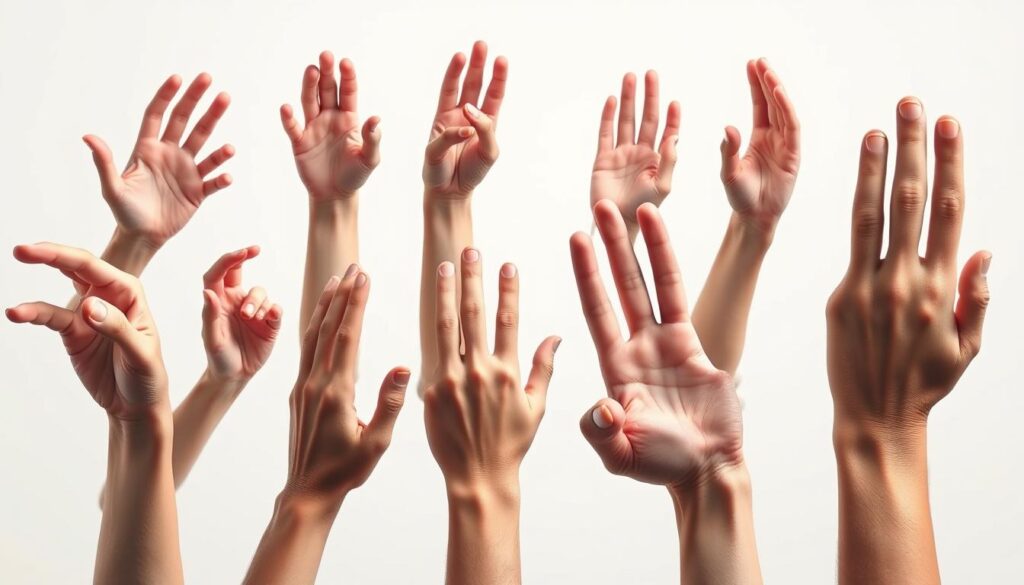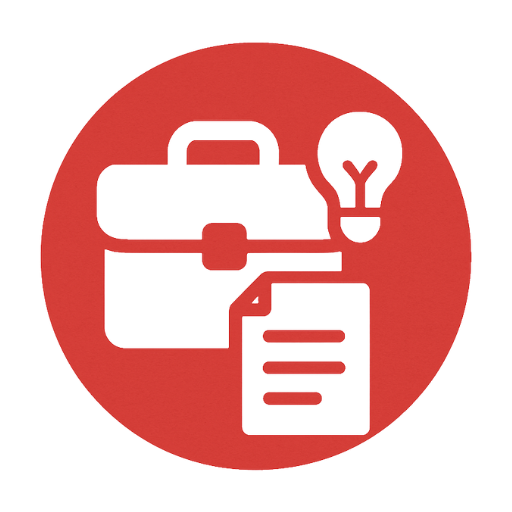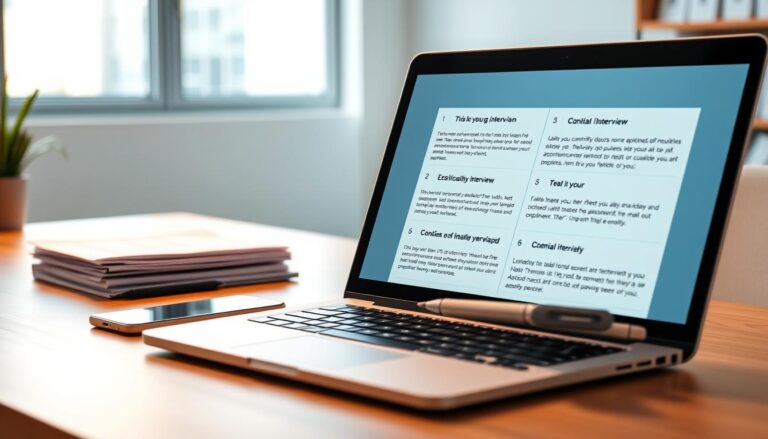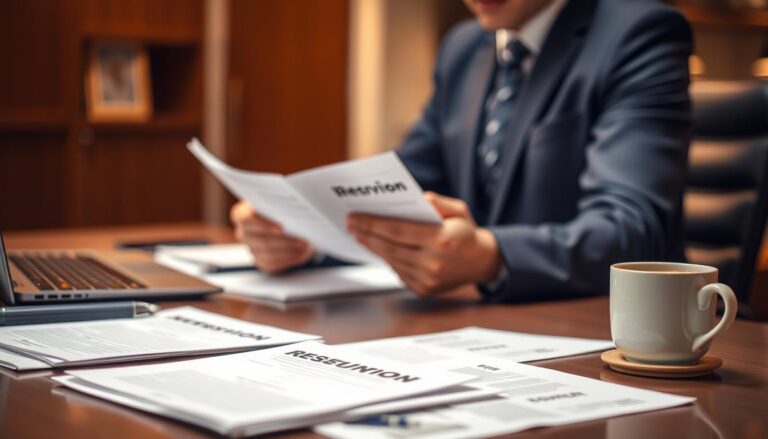Body Language Tips to Impress in Interviews

Getting a job is not just about your skills and experience. It’s also about making a good impression with nonverbal communication. Studies show that nonverbal cues are a big part of job interviews, making up 55% to 93% of communication.
Employers really notice these cues. A candidate’s nonverbal behavior can greatly affect their success. Knowing how to use effective nonverbal communication can help you do well in interviews.
Being good at nonverbal communication is key to impressing in job interviews. It’s important to be aware of your nonverbal cues and use them to your advantage.
The Power of Nonverbal Communication in Job Interviews
In job interviews, nonverbal communication is key. It can make or break a candidate’s chance of success. Studies reveal that 93% of what we communicate is nonverbal. This highlights the need for body language tips to leave a good impression.
Nonverbal communication includes body language, facial expressions, and voice tone. These elements shape the impression a candidate gives. For example, eye contact and confident body language can boost a candidate’s interview success chances.
Interviewers often judge candidates based on nonverbal signals. A candidate with a firm handshake and engaging smile is seen as confident and professional. On the other hand, negative nonverbal cues can harm a candidate’s image and chances of success.
It’s crucial for candidates to grasp the impact of nonverbal communication in job interviews. By mastering body language tips and using positive nonverbal cues, candidates can greatly improve their interview success prospects.
Pre-Interview Body Language Preparation
Before an interview, using certain body language can boost your confidence. Studies show that power poses can make you feel more confident and less stressed.
Try standing tall with your hands on your hips or stretching your arms up for two minutes. This can increase your testosterone levels. It makes you feel more assertive and confident. This simple trick can greatly improve your pre-interview prep.
Effective Two-Minute Power Pose Routine
To add power poses to your pre-interview routine, follow this easy two-minute exercise:
Start by standing tall with your feet shoulder-width apart and your hands on your hips. Hold this for one minute, breathing deeply to calm down.
Then, stretch your arms up overhead, keeping them straight and palms up. Hold this for another minute, feeling your confidence grow.
This two-minute power pose routine can greatly enhance your body language. It helps you make a strong impression during the interview.
It’s all about feeling confident and comfortable in your own skin. With regular practice, you can master using positive body language to impress in interviews.
Making a Strong First Impression
When you enter an interview room, your body language speaks volumes. A firm handshake is key, making up to 65-70% of your first impression. It should be firm but not too tight.
A strong handshake and direct eye contact set a good tone. It’s not just the handshake. Keeping eye contact during greetings is also vital. It shows confidence and makes you seem more trustworthy.
Eye Contact During Greetings
Eye contact is a strong nonverbal signal. When you greet the interviewer, look them straight in the eye. This shows you’re engaged and ready to listen. But, don’t overdo it. Too much eye contact can seem aggressive, while too little might show you lack confidence.
Practice your handshake and eye contact in front of a mirror or with a friend. This will help you improve your body language. Aim to look confident, friendly, and professional.

Mastering these nonverbal cues can make a great first impression. It’s not just about starting well. It’s about setting the stage for a productive and engaging interview.
Body Language Tips to Impress in Interviews
Confidence and professionalism are key to acing an interview. It all starts with your body language. Making a strong impression involves more than just what you say; it’s also about how you present yourself nonverbally.
Seated Posture is crucial when you’re in an interview. Sitting up straight with your shoulders back and feet flat on the floor can create a positive impression. Avoid slouching or leaning back in your chair, as this can give the impression of lack of interest or confidence.
When standing, maintain a confident stance by keeping your shoulders back and your weight evenly distributed on both feet. Avoid fidgeting or shifting your weight from one foot to the other, as this can convey nervousness. Practice standing in front of a mirror to ensure your posture looks confident and relaxed.
Body Language Tips can significantly enhance your interview performance. Practice your posture in front of a mirror or record yourself to identify areas for improvement. By being mindful of your Seated Posture and Standing Posture, you can project a positive and competent image, increasing your chances of impressing the interviewer.
To Impress in Interviews, it’s not just about answering questions correctly but also about how you carry yourself. By mastering your body language, you can show confidence and professionalism, making a lasting impression on your interviewer.
Mastering Eye Contact and Facial Expressions
In job interviews, eye contact and facial expressions are key. Studies show that good eye contact can make you seem 65% more competent. This shows how important it is to get these body language skills right.
Eye contact shows confidence and honesty. It’s important to look at the interviewer and then glance away. Too much staring can seem aggressive, while too little can make you seem dishonest.
Eliminating Unconscious Frowning
Facial expressions are also crucial. A friendly smile can make the interviewer feel more comfortable. But, it’s also key to control microexpressions, which show true feelings.
Practice being aware of your emotions and how they show on your face. Mindfulness and recording yourself in mock interviews can help. This way, you can improve your interview skills.
By working on eye contact and facial expressions, you can show confidence and positivity. These body language tips are vital for a good impression in interviews.
Hand Gestures and Movement Control
Purposeful hand gestures can make your message stronger and leave a lasting impression. Using your hands well can make your communication more engaging and dynamic.
Effective Hand Gestures mean using open and relaxed movements. Don’t cross your arms or clench your fists, as it looks defensive or nervous. Instead, use big gestures to show your points, but don’t overdo it.

It’s also key to control your hand movements to avoid distractions. Fidgeting or tapping can seem like you’re anxious or impatient. Practice keeping your hand gestures calm and purposeful during your interview prep.
Movement Control is not just about hands; it’s also about your body. Don’t shift too much in your seat or lean forward too much. It can look like you’re too eager or lack confidence.
By getting better at hand gestures and movement control, you can improve your nonverbal communication. This will make a better impression on your interviewers. Practice in front of a mirror or record yourself to find areas to get better.
Adapting Body Language for Different Interview Formats
Virtual interviews are now common, and knowing how to use body language in front of the camera is key. The way you show yourself online can greatly affect what the interviewer thinks of you.
Camera Positioning is very important in virtual interviews. Make sure the camera is at eye level or a bit higher. Sit comfortably with a professional background. This helps you look natural and confident.
Making eye contact is just as crucial in virtual interviews. Instead of staring at the interviewer’s image, look at the camera lens. This makes it seem like you’re directly looking at them, which helps build a connection.
Upper Body Focus Techniques
Pay attention to your upper body positioning. Keep your shoulders relaxed and don’t cross your arms, as it might look defensive. Use gestures to highlight your points, but don’t move too much to avoid being distracting.
To make a good impression in interviews, whether online or in person, knowing your body language is key. Focus on camera positioning, eye contact, and how you use your upper body. This way, you can show confidence and professionalism.
Body Language Mistakes That Cost Job Offers
In the job market, a small body language error can make a big difference. Knowing these common mistakes can boost your chances of impressing employers.
Avoiding Eye Contact is a big mistake. It can make you seem unconfident or dishonest. Good eye contact shows you’re engaged and interested.
Fidgeting or Restlessness is another mistake. It can be distracting and show you’re nervous or impatient. Relaxation techniques before an interview can help.
Crossing Your Arms looks defensive or closed-off. Keep your arms uncrossed and hands visible to show openness and confidence.
Good Posture is also key. Slouching can make you seem less confident or less attentive. Good posture shows respect and confidence.
Knowing these body language mistakes can help you improve. Practice in front of a mirror or with a friend. This will help you Impress in Interviews and achieve Interview Success.
Conclusion
Mastering body language is key to success in interviews. It helps you make a strong impression.
Using the tips from this article can boost your confidence. This can improve your chances of impressing in interviews.
Good nonverbal communication is very important. It can change how the interviewer sees you. This can lead to a successful interview.
Being aware of your body language is crucial. It helps you feel more ready and confident in job interviews.






